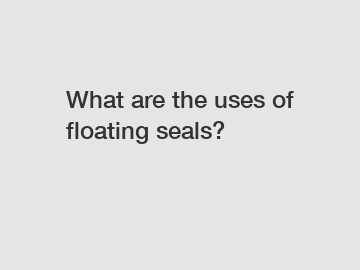Feb. 12, 2024
Mechanical Parts
What are the uses of floating seals?
Floating seals, also known as mechanical face seals or duo cone seals, have a wide range of applications in various industries. These seals are primarily used in heavy machinery and equipment that require dynamic sealing in high-pressure and abrasive environments. The main purpose of a floating seal is to prevent the leakage of lubricants, such as oil or grease, and to keep contaminants out. Let us delve deeper into the origins, reasoning, significance, and impact of these seals in different sectors.
The origin of floating seals can be traced back to the 1920s when they were first used in construction and mining equipment. The need for a robust sealing solution arose due to the high demands and harsh conditions that these machines were subjected to. Typical seals that relied on soft materials or static lips failed to maintain an effective seal in such challenging environments. The concept of a floating seal, with two metal rings in direct contact, was developed to address this issue. By using durable materials and a mechanical face-to-face design, floating seals were able to withstand high pressures, extreme temperatures, and abrasive materials, thus offering enhanced sealing performance.

The reasoning behind the use of floating seals lies in their unique design and functionality. Unlike traditional seals that rely on compression or tension, floating seals utilize a combination of radial and axial forces to maintain an effective seal. The two metal rings, known as the primary and counterface rings, are pressed against each other through an elastic element, such as an O-ring. This design allows for self-alignment and ensures that the seal remains intact even in situations where there may be misalignment or shaft deflection. Furthermore, the use of high-quality materials, such as carbon or stainless steel, ensures resistance to wear and corrosion, enabling floating seals to endure rigorous operating conditions.
The significance of floating seals can be seen across various industries. In construction and mining, these seals are employed in heavy-duty equipment like excavators, bulldozers, and loaders. They protect critical components, such as final drives and gearboxes, from the ingress of abrasive particles, extending their lifespan and reducing maintenance costs. Additionally, in industries like agriculture and forestry, floating seals play a vital role in machinery like harvesters and tractors, preventing lubricant leakage and enhancing overall performance. Moreover, floating seals are also used in marine propulsion systems, oil and gas applications, and even in aerospace technology, proving their versatility and importance.
The impact of floating seals on industries cannot be overstated. The high sealing efficiency provided by these seals ensures optimal performance, increased productivity, and reduced downtime. By preventing lubricant leakage, floating seals minimize oil consumption and contamination, leading to improved environmental sustainability. Additionally, the durability of floating seals translates into lower replacement and maintenance costs, contributing to overall cost savings for businesses. Furthermore, the extended service life of equipment protected by floating seals allows for reliable and continuous operation, which is crucial in industries with demanding schedules and deadlines.
In conclusion, floating seals are essential components used in various industries to ensure effective sealing in high-pressure and abrasive environments. Their origin can be traced back to the need for robust sealing solutions in heavy machinery. The unique design and functionality of floating seals, along with their use of high-quality materials, justify their widespread use. These seals have significant significance across industries, contributing to improved performance, cost savings, and environmental sustainability.
For more custom floating seal factory, oil seal wholesale, Custom Rubber Sealsinformation, please contact us. We will provide professional answers.
If you are interested in sending in a Guest Blogger Submission,welcome to write for us!
All Comments ( 0 )